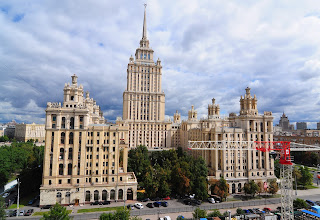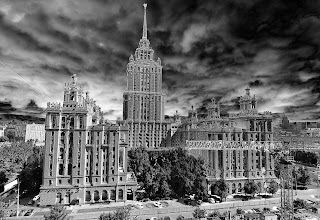How to take dramatically lit landscape on boring light days
Here's a fun technique. I think it's new, but if somebody else has already done this or something similar, please feel free to correct me. The technique allows you to
simulate very directional lighting even on days with so-so lighting, but
it does take a little bit of planning.
Let's say you're out and about shooting photos, and there's a light overcast/mixed cloudy sky. If you wait until a break in the clouds hits your subject, you can take photos like this one:
Decent, but nothing too spectacular. How could you make the lighting more dramatic? One option would be to mess around with levels or curves, but that's going lead to clipping of highlights and/or shadows, pretty soon. Like so:
So here's my idea. First you wait until the clouds move a bit and your subject is in shade. Then you take a SUPER boring picture like this one from exactly the same camera position. This photo has completely diffuse lighting and next to know threedimentionality:
How does that help us? Basically you take the semi-boring picture, and subtract the super-boring one from it in photoshop. If you have something semiboring and subtract the superboring part from it what's left something very exciting:
This process simulates what the scene would have looked like if it was lit by a single spotlight in the position of the sun, without any atmospheric scattering or reflections from the ground and other buildings (the levels of the resulting pictures are likely to be off, you should apply curves to space out the histogram). For this subject, this is probably excessively harsh for this specific application, so we then take this hard light photo and blend it with the original semiboring one to get a moderately dramatic image:
Again, you'll probably have to apply curves after blending. This simulates the sort of look you get if you take landscapes right before or after a thunderstorm, when the subject is sunlit, but diffuse light is blocked by dark clouds.
An trippier version involves using the difference blend mode in photoshop, rather than subtract. However the color will go completely crazy, so you should change it too black and white, like so:
Note that both original pictures were taken as 8bits/channel jpgs, and the subtractions throws away a lot of bits. You should use RAW if you want to try this.
Have fund with this!
Let's say you're out and about shooting photos, and there's a light overcast/mixed cloudy sky. If you wait until a break in the clouds hits your subject, you can take photos like this one:
Decent, but nothing too spectacular. How could you make the lighting more dramatic? One option would be to mess around with levels or curves, but that's going lead to clipping of highlights and/or shadows, pretty soon. Like so:
So here's my idea. First you wait until the clouds move a bit and your subject is in shade. Then you take a SUPER boring picture like this one from exactly the same camera position. This photo has completely diffuse lighting and next to know threedimentionality:
How does that help us? Basically you take the semi-boring picture, and subtract the super-boring one from it in photoshop. If you have something semiboring and subtract the superboring part from it what's left something very exciting:
This process simulates what the scene would have looked like if it was lit by a single spotlight in the position of the sun, without any atmospheric scattering or reflections from the ground and other buildings (the levels of the resulting pictures are likely to be off, you should apply curves to space out the histogram). For this subject, this is probably excessively harsh for this specific application, so we then take this hard light photo and blend it with the original semiboring one to get a moderately dramatic image:
Again, you'll probably have to apply curves after blending. This simulates the sort of look you get if you take landscapes right before or after a thunderstorm, when the subject is sunlit, but diffuse light is blocked by dark clouds.
An trippier version involves using the difference blend mode in photoshop, rather than subtract. However the color will go completely crazy, so you should change it too black and white, like so:
Note that both original pictures were taken as 8bits/channel jpgs, and the subtractions throws away a lot of bits. You should use RAW if you want to try this.
Have fund with this!







I've seen this technique used with artificial lighting rigs to capture normal maps for computer graphics purposed, but never before seen anyone clever/crazy enough to try this outdoors. Excellent stuff!
ReplyDeleteI'm getting fairly good at Photoshop but I don't know what subtraction is. Could you please provide a link? This is interesting. Thanks!
ReplyDeleteHi George: here's how to get to the blend modes menu: https://youtu.be/nrm-zZcWE50?t=1m29s . Subtract and difference are somewhere in there. Please send me the links to your results!
ReplyDelete